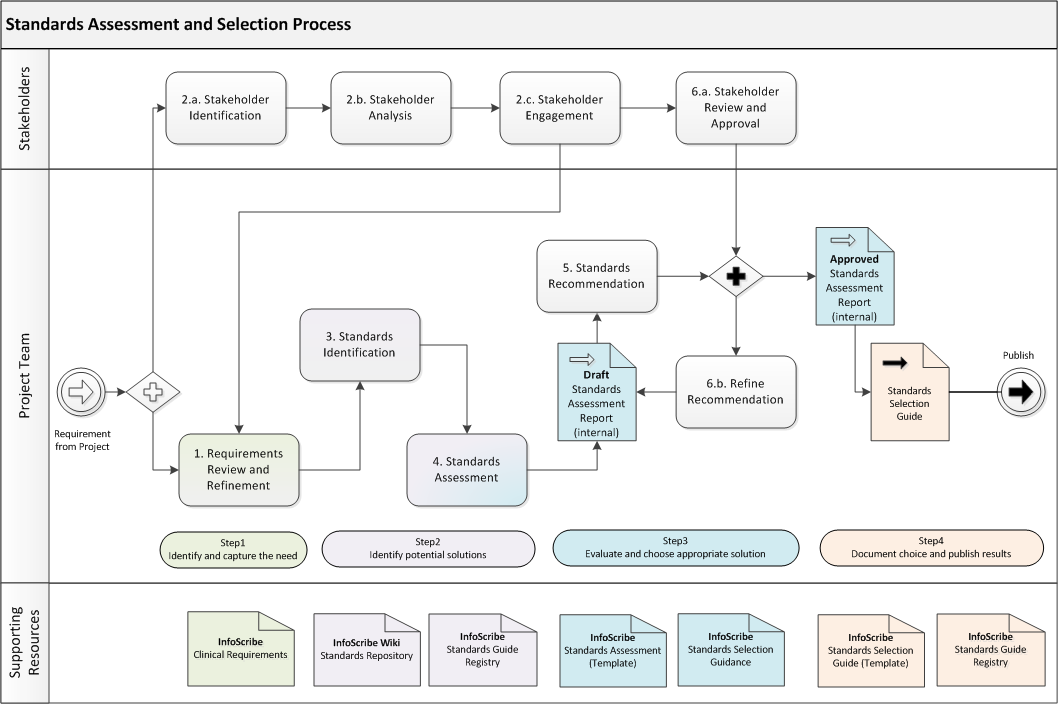Overview
This section provides a structured Standards Assessment and Selection Process to reference when planning or performing standards assessment and selection. The activities outlined below and illustrated in Figure 1 will typically be performed in the conceptual design phase of a project as the outcome of the selection decision may impact downstream plans to design, develop and implement the standards based solution.
The companion Standards Assessment Template is aligned with the process and is recommended for use when documenting the assessment process, recommendation and decision.
Figure 1: Standards Assessment and Selection Process
Prerequisites
Standards Selection Decisions should take place within projects which provide functional scope, requirements, constraints and stakeholders to support the standards selection decision.
Relevant Business Requirements and Use Cases should be defined and documented as an input to the selection process.
Requirements Review and Refinement
Objectives:
- Establish a core understanding of the project’s interoperability and standardization needs within the project team;
- Establish a concise business level description of the interoperability requirement, standardization requirement and key actors (both humans and systems); and
- Establish conceptual level views of the data flows and/or information to identify the points of interoperability subject to standardization.
Stakeholder Identification, Selection and Engagement
Objectives:
- Identify the individuals and groups who are most impacted or most able to influence the outcome standards assessment and selection decision; and
- Review and, if necessary, augment project stakeholder engagement, communication and governance plans to engage those individuals needed to help develop, review, approve and/or champion the standards selection decision.
Supporting Documentation:
- The Infoway Change Management Toolkit provides guidance and templates to support stakeholder assessment and selection.
Standards Identification
Objective:
- Perform an environmental scan to identify solutions employed by projects with similar requirements and use cases and identify candidate standards well aligned with project requirements.
Supporting Documentation:
- The Standards Selection Guides - Registry provides information on Standards Selection decisions undertaken by other projects;
- The Standards Wiki provides an overview of relevant standards in use in Canada and Internationally; and
- General Assessment Criteria provided on this site may be used as a screening tool to short list candidate standards for further evaluation.
Standards Assessment
Objective:
- Perform a structured assessment of the candidate standards to evaluate fit for purpose, stewardship, and standards quality.
Consideration:
- Where multiple Interoperability Specifications based on the same base Standard have been short listed for evaluation consider evaluating the core standard in relation to other options first then evaluate the different Interoperability Specifications only as warranted.
Supporting Documentation:
- General Assessment Criteria and Standard Specific Assessment Criteria provided in this site may be used with a scoring methodology to support a structured assessment.
- The companion Standards Assessment Template provides a simple scoring methodology that can be directly applied or adapted to assess a standard against the Evaluation Criteria.
Develop Recommendation
Objective:
- Develop a draft Standards Recommendation Report based on the assessment performed;
- Qualify the recommendation by identifying the factors that significantly influenced the scoring and/or recommendation including stakeholder input.
Supporting Documentation:
- Use of the companion Standards Assessment Template is recommended when documenting the assessment process, recommendation and decision.
Review and Approval
Objective:
- Attain stakeholder support and explicit approval for the standards recommendation.
Considerations:
- The Stakeholder Identification, Selection and Engagement activities (activity 2) will define the approach used to Review, Refine and Approve the Standards Recommendation;
- Although Figure 1 illustrates only a formal review, refinement and approval cycle on deliverable completion projects will typically engage stakeholders and other implementers throughout the process provide input.
Author and Publish the Guide
Objective:
- Collect the conclusions from the Standards Assessment process into a brief Guide that is suitable for sharing with broader audiences on InfoScribe;
Supporting Documentation:
- The Standards Selection Guide template provided on this site offers an easy way to collect and relay the conclusions from the approved assessment process
- Creating and more importantly publishing a final Selection Guide offers a number of advantages to the market by allowing other parties to discover and reuse the solution your project developed.
